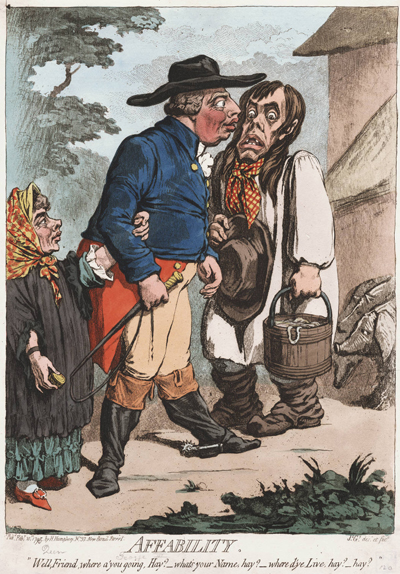Affability
In 1795, according to David Bindman in The Shadow of the Guillotine, there was a concerted effort within much of the visual culture in Britain to portray the King and the country positively in contrast to life in France under a violent and ever-changing revolutionary government. The homespun virtues of "Farmer George" and the blessings of living in Britain were duly trumpeted in spite of record cold temperatures, bread riots, and an ever present threat of French invasion.
Not surprisingly, with his uncanny ability to imagine the worst, Gillray did not follow suit. Indeed, it is worth remembering that the seemingly comical Affability was sandwiched between The Genius of France Triumphant. . ., where we see the humiliating spectacle of Britannia brought to her knees before France, and the (literally) dark and forbidding Patriotic Regeneration where a now sans-culotte English Parliament, acting much like the French Directorate, is bringing its erstwhile leader, William Pitt, to a mock trial where the outcome is a foregone conclusion.

© Lewis Walpole Library, Yale University
In this context, Affability ceases to amuse. Instead of a royal couple with at least some pretence of tending to the business of the country—pinching pennies to keep royal expenses down, or refraining from sugar in protest against the slave trade—Gillray presents a King who looks and sounds half mad and his dwarfish consort, "Snuffy Charlotte," who apparently can't go out without carrying her snuff box. Her mild attempt at restraining her royal husband from an "in your face" interrogation of a poor and terrified farmer is wholly ineffectual. Indeed, the only character in the scene that finds any of this comical is the pig who appears to be looking on, slightly amused.
During the King's madness in 1788, Gillray and his fellow caricaturists were remarkably restrained, scarcely alluding to the King's condition and the constitutional crisis that it was prompting. Here in 1795, we see, perhaps, the most direct portrayal of a mad King in Gillray's work. Why bring it up now?
One reason, as Bindman points out, was clearly to satirize the whole political program of promoting "Farmer George", the good king disdaining the pomp and circumstance of royalty and going out among his subjects to talk farming. But Gillray may also be remembering that the King's trips to country resorts were usually taken when symptoms of his madness began to reappear, and the Royal Family had, in fact, spent much of the summer in Weymouth where stories of the King's agressive behavior were commonplace. Taken in context with the other prints Gillray was creating at the time, then, Affability would seem to portray a King, like his parliament and country, madly out of control. And the terrified expression of the poor farmer may be more than just a reaction to his odd behaviour.
Sources and Reading
- Commentary from the British Museum on Affability.
- Draper Hill, Fashionable Contrasts, 1966, #63
- "George III of the United Kingdom," Wikipedia
- "Charlotte of Mecklenburg-Strelitz," Wikipedia
- "Snuff (tobacco)," Wikipedia
- 'Farmer George'? Notes on Agriculture
- Janice Hadlow,A Royal Experiment, 2015,
- Thomas Wright and R.H. Evans, Historical and Descriptive Account of the Caricatures of James Gillray #120
- Thomas Wright and Joseph Grego, The Works of James Gillray, the Caricaturist; With the History of His Life and Times p. 187
Comments & Corrections
NOTE: Comments and/or corrections are always appreciated. To make that easier, I have included a form below that you can use. I promise never to share any of the info provided without your express permission.